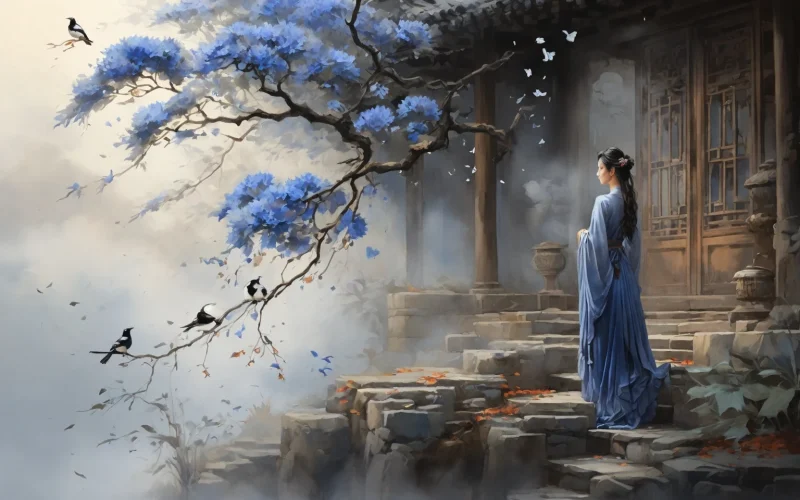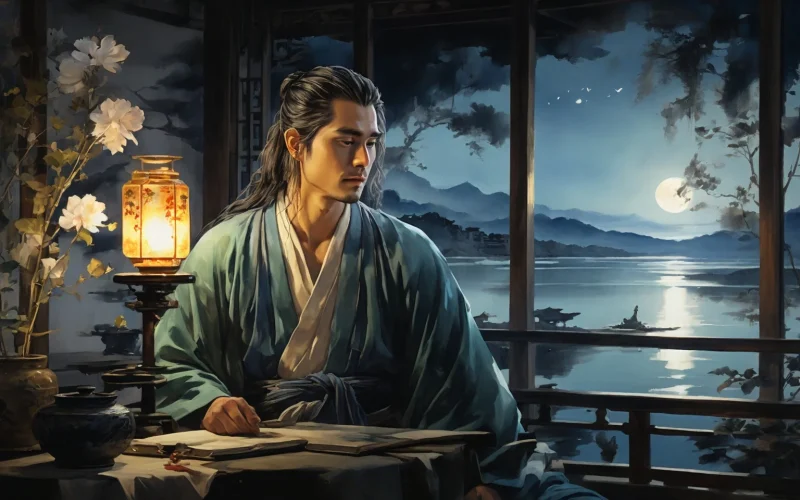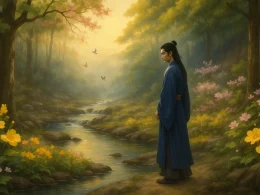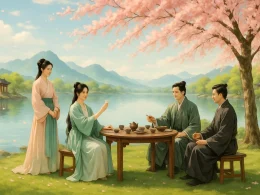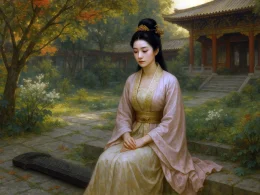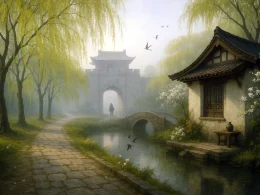When the Emperor sought guidance from wise men, from exiles,
He found no calmer w i sdom than that of young Chia
And assigned him the foremost council-seat at midnight,
Yet asked him about gods, instead of about people.
Original Poem
「闺情」
李端
月落星稀天欲明,孤灯未灭梦难成。
披衣更向门前望,不忿朝来鹊喜声。
Interpretation
This seven-character quatrain depicts a wife's midnight longing for her absent husband, portraying the loneliness and yearning of ancient women through the lens of boudoir sentiment. The poet uses the nighttime scenery as a backdrop, skillfully weaving together the quiet of the night, the woman's solitude, and the misleading sounds of the outside world to paint a vivid portrait of a pining wife's emotional state.
First Couplet: « 月落星稀天欲明,孤灯未灭梦难成。 »
Yuè luò xīng xī tiān yù míng, gū dēng wèi miè mèng nán chéng.
The moon has set, stars grow sparse—dawn approaches; The lone lamp still burns, yet dreams remain elusive.
These lines establish a desolate and lonely atmosphere through the description of the fading night. The woman's sleeplessness hints at her restless longing, her solitude emphasized by the "lone lamp" that mirrors her isolation.
Second Couplet: « 披衣更向门前望,不忿朝来鹊喜声。 »
Pī yī gèng xiàng mén qián wàng, bù fèn zhāo lái què xǐ shēng.
She throws on her robe, steps once more to the door to gaze out— Resentful now of the magpie’s morning cry of "joy."
Here, the woman's action—rising to look outside—reveals her desperate hope for her husband's return. Yet the magpie’s auspicious call, traditionally a sign of good news, only deepens her frustration, exposing her disappointment at his continued absence.
Artistic Merits
The poet renders the woman’s emotions with exquisite subtlety, merging environmental details with her psychological state. The interplay of "setting moon," "fading stars," and the "lone lamp" heightens the sense of isolation, while the magpie’s deceptive cheer and her sharp resentment ("不忿") create a poignant emotional contrast. The poem’s power lies in its restraint—each image and gesture carries unspoken weight.
Holistic Appreciation
In just four lines, the poem traces a quiet yet intense emotional arc. The first couplet immerses us in the stillness of night, the second in the woman’s restless action, and the final line delivers her bitter realization. The structure moves seamlessly from quietude to agitation, then back to a resigned silence, mirroring her fluctuating hopes. Through spare language and natural imagery, the poet elevates an ordinary moment of waiting into a timeless meditation on longing and disillusionment.
Insights
This poem demonstrates how environment and psychology can intertwine to reveal profound emotion within mundane moments. The poet’s economy of words—where every detail serves dual purposes—teaches us the art of implication. In an age of explicit expression, it reminds us that the deepest feelings often resonate most powerfully when whispered, not shouted. The wife’s story, though centuries old, speaks universally to the ache of unmet hope and the quiet resilience of the human heart.
Poem translator
Xu Yuanchong (许渊冲)
About the poet
Li Duan (李端) was a native of Zhao County, Hebei Province. Li Duan was a native of Zhao County, Hebei Province. He was admitted as a jinshi in 770 AD, and was one of the “Ten Scholarly Men of the Dali Dynasty”. He was one of the “Ten Scholars of the Dali Dynasty”. His poems were often sent as farewells and gifts, and he was highly praised for his quick-wittedness.






